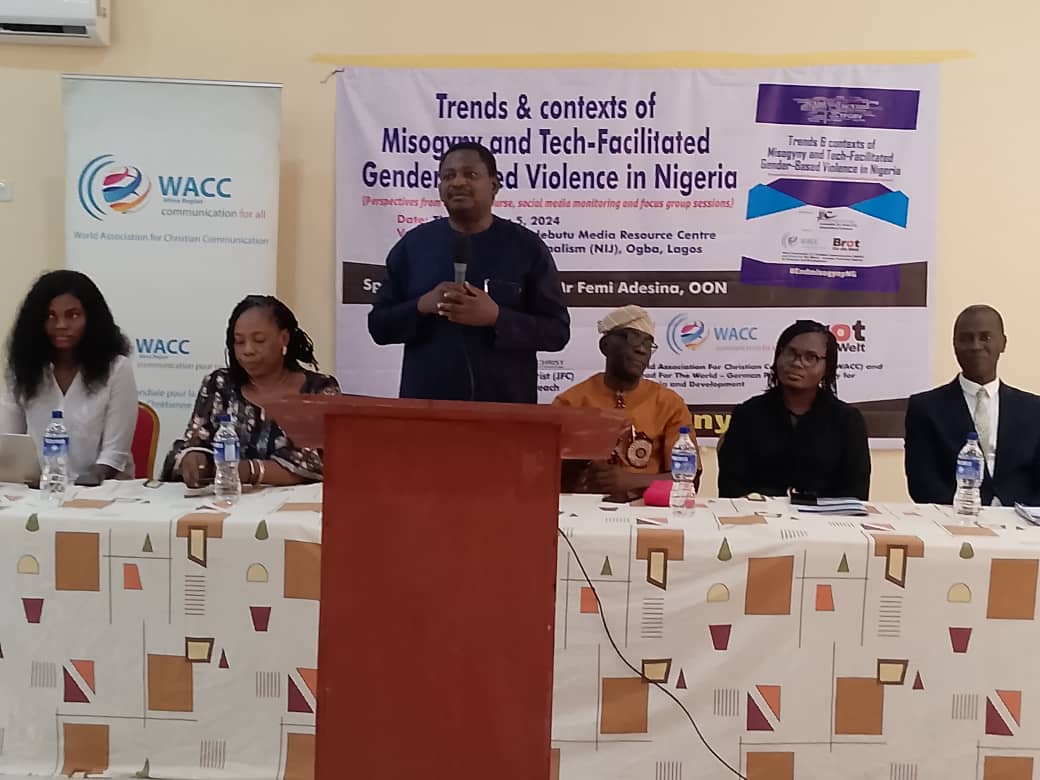The Journalist For Christ (JFC), in collaboration with the World Association For Christ Communication (WACC) and other relevant stakeholders, on Thursday formally activated the #EndMisogynyNG advocacy campaign in Lagos, Nigeria.
The event held at the Sir Kensington Adebutu Media Resource Centre, Nigerian Institute of Journalism (NIJ), Ogba Lagos focuses on trends and contexts of Misogyny and Tech Facilitated Gender-Based Violence (TFG-BV) in Nigeria.
In the spirit of the #16DaysOfActivism to end all forms of Gender-Based Violence in society, the keynote speaker, Mr Femi Adesina, former Special Adviser on Media and Publicity to the immediate Past President, Muhammadu Buhari urged participants to propagate the JFC report on Misogyny.
According to him, this will enable guilty perpetrators who are involved to stop all forms of antisocial and dehumanizing acts before they become an uncontrollable vice in society.
Correspondingly, the Provost of the Nigerian Institute of Journalism (NIJ), Mr Gbenga Adefaye who applauded the advocacy initiative of JFC founding President and Project Coordinator, Mr Lekan Otunfodunrin said, “This is a very good thing, and I would love to see and read this report because some of us may be an unconscious misogynist, acting unplanned or not being deliberate as agents who are mad at women.”
Speaking further, he emphasised how he is interested and eager to read the JFC report in order to learn and reflect if he was a misogynist or not.
The Project Officer and Publisher of BoNews, Ms Blessing Oladunjoye who spoke on the theme, “Understanding the Issues in Monitoring Social Media On the Trends of Misogyny and Tech-Facilitated Gender-Based Violence,” stressed how TFGBV is a form of GBV which is predominantly carried out online on digital spaces.

“This act usually targets women with the purpose of harassing them through electronic means or technological devices and is carried out via online channels or platforms,” she said.
She, however, mentioned various forms and categories of TFGBV that include cyberbullying, doxxing, trolling, online sexual harassment and revenge porn while explaining the findings from the social media monitoring on the trends of Misogyny and TFGBV in Nigeria.
She said, “We discovered 49 cases of TFGBV on Facebook, 8 on X and Instagram, and 1 case on TikTok of a total of 66 cases found online.”
According to her, the percentage of male perpetrators of Misogyny is 28.8% which comprises 19 posts, while female perpetrators comprise 25.8% of 17 posts, and Bloggers and Skit Makers with 22.7% of 15 posts and social media influencer/ public figure and other were 4.6% with 3 posts and some unascertained account holder with unclear identity to be 13.6% with 9 posts respectively.” Blessing emphasized.
She vividly gave examples of women who were victims of Misogyny and TFGBV with reference to how the announcement of Umeogi as the CEO of Zenith Bank sparked various misogynistic reactions online.
Sharing from a post on X by @Olabode_ifeanyi on March 19, 2024, sparked 1.8 million views, 3,000 quotes and almost 9,000 likes as the post read thus- “The new Zenith Bank CEO’s profile gives me orgasm.” The author and poster sexualized the CEO’s professional achievement through a sexual.
Though he later apologized, the damage has been done. But other social media users had reacted that the writer would not have used the term “orgasm” if a man with a similar profile were to be appointed as the CEO.
Another example of Misogynistic content on social media was from one Azolike Nonso Afameduna who wrote: ” Adaora Umeoji, the woman appointed as Zenith Bank Plc’s first female CEO, looks like a hookup girl. I will never take that bank seriously again.”
Sadly, the post which tends to trivialize women’s career success reinforces harmful stereotypes and downgrades women’s achievement as they are judged by their looks instead of their professional competence ultimately exemplifying some of the Misogynistic acts perpetrated on the digital space.
Also, the JFC Vice President, Ugonma Cokey spoke on “Key Highlights from Focus Group Discussions (FGDs) and Trends of Misogyny and Tech-Facilitated Gender-Based Violence in Nigeria.
She revealed that the FGDs had 8 different groups ranging from female students in tertiary institutions, women Professionals, female Journalists across the country, social media enthusiasts, people living with disability and a special session for the males, to generate insights for the dissemination of digital counter-narrative and strategic advocacy interventions to mitigate Misogynistic attitudes and Gender-based cyber violence in Nigeria.
Ugonma reiterated how the focus group discussion for men was fascinating and became essential, because it serves as an avenue to orientate more men, in silencing various misogynistic activities in the society.
She further revealed some highlights from the discussion, which include how WhatsApp groups have been used as a platform for shaming women, with men posting sexually explicit pictures of women.
Some men are attracted to women living with disabilities, using their vulnerability to take advantage of them, by pretending to offer assistance, but end up sending unsolicited sexual images and posts to them. The patriarchal nature of the society, including inherent tradition and religious beliefs encourages Misogyny and TFGBV.
Violence against women exists both offline and online. While offline has to do with physical assault, online has to do with cyber assault. Some men are misogynistic in nature as a result of skewed and dysfunctional family/ home structure.
Though men are often the perpetrators of Misogynistic and TFGBV, men are also very strategic and important in playing key roles in efforts to curb Misogyny and TFGBV.
The highlighted points led to a clarion call for men to help champion this course while describing the need to change the narratives, as this quote helps to summarize the highlighted points thus- “I have a daughter and I don’t want her to grow up in a world where she is constantly belittled and objectified”
Please follow and like us:


